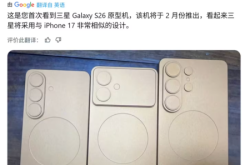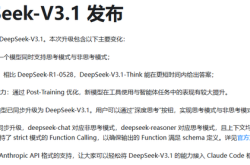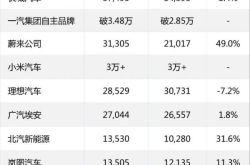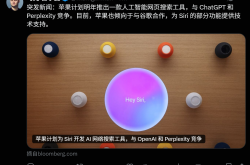"Smart Speakers 'Cooling Off': Are Tmall Genie, DuerOS, and Xiaoai Assistant All Losing Momentum?
![]() 06/28 2024
06/28 2024
![]() 540
540
With the advancement of technology, more and more hardware products are being equipped with new functions, and smart speakers are one of them. Smart speakers, as the name suggests, evolved from traditional speakers. With the support of new technologies such as artificial intelligence, smart speakers can perform various functions through voice commands, including playing songs on demand, weather forecasting, and more.
At one time, smart speakers were extremely popular, attracting major companies to enter the market, and the entire smart speaker industry even witnessed a "hundred-speaker war," indicating the fierce competition. After a period of intense competition, the smart speaker industry has stabilized, forming a market landscape dominated by Baidu, Xiaomi, and Tmall Genie. Data shows that the combined market share of the top three brands in China's smart speaker market has consistently exceeded 90%, reaching 94% in 2023.
Major Companies' "Cold Shoulder" of Smart Speakers
Previously, the smart speaker industry was a booming trend, attracting companies from various industries. Not only were major internet companies represented by Baidu, Alibaba, and Tencent actively involved, but technology companies such as Xiaomi and iFlytek also frequently emerged. However, this good situation did not last long. Smart speakers, which once received much attention, have gradually fallen into silence in recent years, with fewer news about them from major companies.
On the one hand, the sales of smart speakers have continued to decline, limiting the value they can create for major companies. Unlike in the past, when smart speakers were booming, consumers' novelty and desire to purchase have faded, resulting in a decline in sales. According to data from Runto's "Monthly Tracking Report on China's Smart Speaker Retail Market," in 2023, the sales of smart speakers in China reached 21.11 million units, a year-on-year decrease of 19.8%; and the market sales revenue was 5.94 billion yuan, a year-on-year decrease of 21.0%.
As we all know, the previous popularity of smart speakers was not only due to their intelligent functions that sparked consumers' curiosity and freshness but also largely attributed to the low-price strategy implemented by participants. However, while the strategy of trading volume for price can quickly open up the market, it can also compress manufacturers' profit margins to a certain extent. Nowadays, although Baidu, Xiaomi, and Tmall Genie have become the top three brands in the smart speaker industry, the decline in smart speaker sales is an undeniable fact. With limited value they can bring to major companies, which already have numerous businesses, it is only natural that they will place less importance on this business.
On the other hand, major companies' attention to smart speakers has declined, and the frequency of product iterations has significantly decreased compared to the past. Product innovation is crucial for maintaining consumers' attraction to intelligent hardware products, including smart speakers, which is why smart speaker manufacturers continue to introduce new products. However, as major companies' emphasis on smart speaker products decreases, the frequency of iterations for these products has also declined.
Taking Xiaomi as an example, its smart speaker "Xiaomi AI Touch Screen Speaker" sold on its official website was released in February 2019; "Xiaomi AI Touch Screen Speaker Pro 8" was released in December 2019; "Xiaomi AI Speaker Play Enhanced Edition" was released in August 2021; and "Xiaomi Smart Home Screen 10" was released in April 2022. From a vertical comparison, Xiaomi's frequency of updating smart speaker products is gradually decreasing, and it can be said that they are "annual updates," indicating that major companies' investment in smart speakers is declining.
The "Awkward" Smart Speaker
Currently, the smart speaker industry can be said to have entered a trough, and the trend of declining sales has not stopped. According to data from Runto's "Monthly Tracking Report on China's Smart Speaker Retail Market," in the first quarter of 2024, the sales of smart speakers in China reached 3.918 million units, a year-on-year decrease of 31.4%. So, what are the reasons for smart speakers gradually falling from grace and becoming silent?
Firstly, there are limited innovations in smart speaker products, making it difficult to stimulate consumers' willingness to purchase. As mentioned earlier, one of the important reasons why consumers rushed to buy smart speakers was their intelligent functions. However, as more and more traditional home appliances upgrade towards intelligence, the label of intelligence is no longer unique to smart speakers, and their uniqueness is constantly decreasing, reducing consumers' attention.
At the same time, due to the reduced emphasis on smart speaker business by major companies, their investment in smart speaker products has also decreased, and the innovation speed of these products has slowed down. Innovation is the key to stimulating consumers' interest, and the lack of innovation in smart speaker products makes it difficult to attract consumers again.
Secondly, the usage scenarios for smart speakers are limited, and it is difficult for users to develop the habit of using them. As we all know, the biggest feature of smart speakers is their voice interaction function, which limits their usage scenarios. Although smart speakers have undergone multiple upgrades and are now developing towards screens, their usage scenarios are still relatively limited compared to other intelligent hardware products. Therefore, it is difficult for consumers to develop the habit of using smart speakers and lack motivation to replace them with new products.
Thirdly, the positioning of smart speakers is relatively vague, and they are highly replaceable. Currently, most smart speakers on the market can achieve functions such as voice control of smart homes, music playback, information inquiry, and ordering. "Screen-equipped" smart speakers even have functions such as video calling and watching dramas, making their functions quite rich. However, all these functions can be easily achieved with a smartphone, which can be carried around and is not limited by space. Smart speakers cannot achieve this. Therefore, smart speakers have weak uniqueness and high replaceability, which explains why consumers do not use them frequently.
In addition, another important reason why smart speakers were previously popular was that they were seen as the entry point for smart homes. In recent years, the wave of smart homes has swept across the market, giving rise to more and more smart home products. To provide consumers with a more convenient and efficient smart home experience, a core is needed to connect these products, and the voice interaction function of smart speakers once made them seen as the entry point for smart homes. However, with the continuous upgrade of the intelligence level of smart home products, the voice interaction function is no longer unique to smart speakers, and their value as an entry point for smart homes has gradually diminished, further reducing their appeal to consumers.
AI Large Models Cannot Save Smart Speakers
When it comes to the hottest topic in recent years, it must be AI large models. As the value of AI technology is once again proven, various industries are actively deploying AI large models, hoping to obtain new development opportunities by deepening the integration of the industry and AI large models. The smart speaker industry is one of the pioneers in embracing AI large models.
Specifically, as early as February 9, 2023, DuerOS announced that it would integrate Wenxin Yiyan to create an AI model called "DuerOS Lingji" for smart device scenarios and apply it to all DuerOS products. On April 11 of the same year, Tmall Genie also announced that it would officially integrate with Alibaba Tongyi Qianwen. It can be seen that AI large models have become a new breakthrough point for smart speakers to overcome growth difficulties. However, as time goes by, news about the integration of smart speakers and AI large models has gradually subsided. In the first quarter of this year, smart speakers still failed to break through the growth bottleneck, with sales continuing to decline. AI large models did not become the "lifesaver" for smart speakers.
On the one hand, there are numerous intelligent hardware products equipped with AI large models, and users do not necessarily choose smart speakers to try out the functions of large models. Currently, various industries are actively embracing large models, and many intelligent hardware products are accelerating their integration with AI large models to provide consumers with different user experiences, such as smartphones and tablets equipped with AI large models. The launch of these intelligent hardware products has attracted considerable attention from consumers, and smartphones and tablets can be considered as essential products with high usage frequency. Therefore, if consumers only want to try out the charm of AI large models, they may prefer to choose other intelligent hardware products rather than smart speakers.
On the other hand, AI large models focus more on content creation capabilities, while smart speakers emphasize voice interaction capabilities. The degree of fit between the two is not that high. Undoubtedly, the emergence of AI large models has greatly improved the efficiency of content production. However, the content production capabilities of AI large models are more reflected in aspects such as text, images, and videos. For example, AI large models can achieve functions such as text creation and video creation. However, the intelligence of smart speaker products is reflected in their voice interaction function, which means that the powerful content production capabilities of AI large models are difficult to leverage in smart speaker products, resulting in limited changes they can bring to smart speaker products.
However, it must be said that the combination of AI large models and smart speakers is not meaningless. With the empowerment of AI large models, the understanding ability of smart speaker products can be improved, addressing their lack of intelligence and providing consumers with a more superior voice interaction experience. Nevertheless, due to the non-essential nature of smart speakers, even with the support of AI large models, it is difficult to reignite consumers' purchasing desire. Currently, relying solely on AI large models to help smart speakers break through the growth dilemma may not be enough, and smart speakers need to find new avenues.







